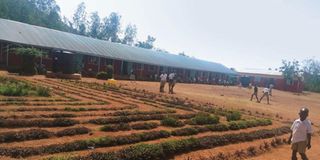Plagued by intestinal worms

What you need to know:
- Given their tendency to deny the body crucial minerals, intestinal worms can hamper children’s learning ability.
- Usenge Primary is one of the institutions whose learners have been covered in a government deworming programme.
- In September 2021, Siaya County was among 14 devolved units whose schools received deworming pills from the government.
Times without number, Mr Thomas Ooko, a lab technologist in Usenge, Siaya County, has spotted worms or their eggs in the patients’ stool samples he tests.
“Ascaris lumbricoides (large roundworms) are very common,” says Mr Ooko, who works at Afyatele Centre, a private health facility.
Being close to Lake Victoria, Usenge faces an unabated threat from intestinal worms and bilharzia, parasites considered neglected.
Mr Ooko says the wanting levels of sanitation in the area are to blame. “We have places where we don’t have latrines. Along the beaches, latrines are very few,” he says. Lack of latrines means human waste finds itself to the lake shores and that is the water people fetch, creating a breeding ground for the pests.
One Usenge resident, a father of a three-year-old girl, admits there is a problem. He is Mr Ibrahim Ochieng, a vocational college student who works as a motorcyclist during breaks.
The water used in his household in Goma village is fetched from Lake Victoria. During the interview, he says it is barely two months since he bought deworming pills for his daughter. And this was the third time to administer the pills to the girl.
“Since I was young, I have seen people being given medicine to kill worms. When you’re unable to eat and you’re vomiting, and when your stomach is swelling, you get the medicine,” he says.
Given their tendency to deny the body crucial minerals, intestinal worms can hamper children’s learning ability. Mr Josiah Langi, a senior teacher at Usenge Primary School who heads deworming programmes there, knows this too well.
“You can notice those who have swollen tummies; those who are assumed to be healthy and parents think it’s good,” he says.
After deworming, he says, affected children become more active and their bodies become “normal”. Worms and bilharzia plague children at the school a lot.
“Bilharzia is common because some people don’t have toilets. And when they deposit waste in the open, all that water goes back to the lake. If the waste has the eggs, they mature in the water snails. And this is the same water that people fetch. So, they bring it home direct; which is why it becomes large-scale,” says Mr Langi.
Usenge Primary is one of the institutions whose learners have been covered in a government deworming programme. In September 2021, Siaya County was among 14 devolved units whose schools received deworming pills from the government.
Others were Narok, Nyamira, Kisii, Migori, Busia, Kisumu, Homa Bay, Lamu, Tana River, Kilifi, Mombasa, Kwale, and Taita Taveta.
Under the programme, children aged between two and 14 — whether in school or not — get deworming pills from a teacher assigned to the task in a particular school.
A statement on the Health ministry’s website indicates that last year, the National School Based Deworming programme targeted a total of 6.6 million children countrywide and that it administered deworming pills in two phases — in March and September.
Has the impact of the deworming programme been felt? Mr Langi thinks so.
“There is less absenteeism and healthier students,” he says.
In the neighbouring Busia County, the coordinator for Neglected Tropical Diseases Evans Shiraku says worms are a persisting problem though collection of data has its setbacks.
“Intestinal worms are associated with poor sanitation, and poverty is a big contributor,” he says.
The setback with data collection is that most people go to the local chemist for medication first before they can consult a government facility.
“It has been a problem for a long time and it’s still a problem because you can’t just intervene in somebody’s premises. But there are those that are registered and we have shared our databases with them,” he adds.
Dr Ben Otieno is one of the private practitioners in Busia. He says he sells medicine for treatment of intestinal worms at least three times every month; and that a distended stomach is a common symptom.
“This is especially for children who live in remote areas. Others lack proper nutrition and hardly get a balanced diet. Others eat soil,” reasons Dr Otieno.
Albendazole, a broad-spectrum drug that tackles round worms among other intestinal worms, is the most popular drug he sells.
But even with the help of private pharmacies, some cases still get to public hospitals.
Ms Salome Wesonga and Mr Kenneh Yatich, who are based at the children’s health clinic of Vihiga County Referral Hospital, approximate that for every 10 sick cases they handle, about three have intestinal worm issues. In severe cases, such children are brought suffering from anaemia.
Ms Wesonga says pig rearing, a practice that is fast gaining ground in Busia, is a contributor to the prevalence of intestinal worms in the border county.
The officers say a mass deworming campaign in the county targeting both children and adults can be a big boost in the war against intestinal worms.
“
We also need to educate the masses about hygiene,” says Mr Yatich.
This report is produced in partnership with the African Investigative Journalism Conference, an initiative of the Journalism Department at the University of Witwatersrand in South Africa, and the Nation Media Group.





